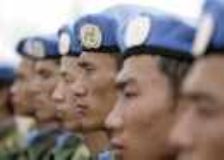Darfur mission may need China to avert “humiliation”
By Karl Maier and Bill Varner
November 21, 2007 (ELFASHER/UNITED NATIONS) — Ian Divers shook his head in frustration as an aide told the United Nations official that Sudanese security officers had just seized two satellite dishes vital to communications for the peacekeeping mission in Darfur.
 It was another setback for the plans of President George W. Bush and European leaders such as British Prime Minister Gordon Brown, who have vowed to end the suffering of millions in western Sudan. Those leaders may now have to push China to use its influence as Sudan’s major trading partner to get the needed 26,000 soldiers and police into Darfur by mid-2008.
It was another setback for the plans of President George W. Bush and European leaders such as British Prime Minister Gordon Brown, who have vowed to end the suffering of millions in western Sudan. Those leaders may now have to push China to use its influence as Sudan’s major trading partner to get the needed 26,000 soldiers and police into Darfur by mid-2008.
The head of UN peacekeeping operations, Jean-Marie Guehenno, told the Security Council on Nov. 14 that he’s concerned the peacekeepers may come under attack from Darfur rebel groups or government-backed militias early next year, before the force reaches full strength. They would find it “very hard” to recover from “humiliation” at that stage, he said.
One of the largest and most dangerous peacekeeping missions in UN history is in danger of falling apart because of Sudan’s resistance to some troop units, such as Scandinavian engineers; a boycott of peace talks by rebel groups and a lack of critical Western air support. Bureaucracy abounds: Divers said that while Sudan’s foreign ministry cleared the satellite dishes for release to the UN, no one told the security officers.
‘RIDICULOUS’ PROBLEMS
“It goes from the sublime to the ridiculous, from the important to the trivial each day,” Divers said late last month as he walked among buildings being assembled behind an earth wall in El Fasher, the mission’s headquarters. The New Zealander is also supervising the building of 60 UN base camps and supply lines stretching across hundreds of miles of desert.
Among the few options to get the mission on track is to persuade China, a permanent Security Council member, to step up pressure on the government in Khartoum, South African Ambassador Dumisani Kumalo said. China is a major buyer of Sudanese oil and invests in expanding Sudan’s production of crude. Envoys said imposing more sanctions on Sudan or delaying the troop deployment have been ruled out.
China, which resisted the Darfur mission and sanctions on Sudanese government leaders, is sending engineers into Darfur and is willing to press President Umar al-Bashir to cooperate with the UN, Deputy Ambassador Liu Zhenmin said in New York.
“We don’t say we have economic influence, but we have talked with the Sudanese and tried to persuade them to accept the arrangement,” Liu said. “We use diplomacy, and they say they are going to be cooperative.”
JAN. 1 TARGET
The immediate target for the UN and African Union is to assume command on Jan. 1 from the 7,000 AU troops that have been in Darfur since 2004. The under-manned, under-equipped Africans haven’t been able to stop a conflict that has killed at least 200,000 people and turned 2.5 million into refugees. Bush calls it genocide.
Sudan has rejected any involvement by U.S. troops, and Bush hasn’t offered any. Major European powers are either wary of the mission’s unprecedented UN and AU joint leadership or say they don’t have soldiers to spare.
“A number of countries, and the United Kingdom is one of them, are engaged in very serious peacekeeping missions around the world,” said Britain’s deputy ambassador at the UN, Karen Pierce, referring to U.K. forces in Afghanistan and Iraq. “There is no way we are going to pull out of those.”
EGYPT’S DIFFICULTIES
Even countries willing to send troops are finding obstacles. Egypt’s ambassador to the UN, Maged Abdelaziz, said the UN refused his government’s offer of 3,000 troops, agreeing to only 1,000 out of concern that a balance of northern, central and southern Africans also needs to be established.
The UN waited almost two months for Sudan to accept a list of 18 potential troop-contributing nations, only to hear this week that engineers from Norway, Sweden and Denmark were rejected. Their work on airstrips and digging water wells would have been essential to moving soldiers in by early 2008.
At the current pace, half of the force may be on the ground by the middle of next year, “if we are lucky,” Divers said.
Logistical hurdles are substantial. The $2 billion-a-year Darfur plan calls for construction of air terminals and aprons for the force’s aircraft, along with 68 police stations and 60 water wells.
Getting needed equipment is vital to securing an area the size of France, in which roads become impassable during the rainy season. Helicopters offered by Jordan had to be turned down because they can’t fly at night.
Political imperatives also are unresolved. Peace talks in Libya last month produced no progress, because at least six rebel factions didn’t attend. Diplomats are trying to end a conflict that began in February 2003 when rebels demanding a larger share of political power and oil wealth began attacking government forces.
“I am worried,” Abdelaziz said in an interview. “This was supposed to have been finished by the end of the year, and you need a peace to keep.”
(Bloomberg)
